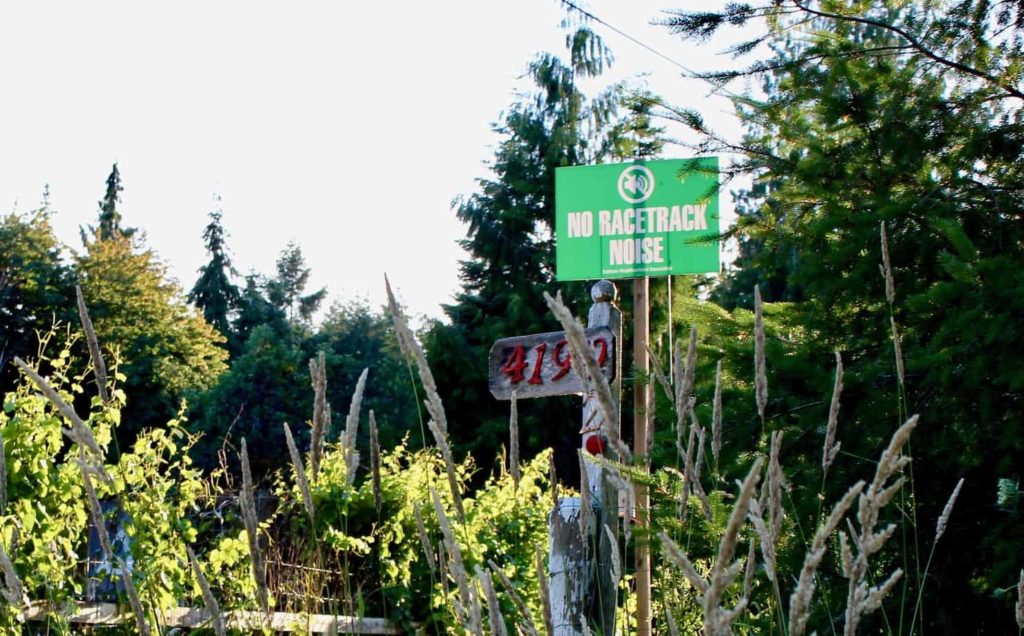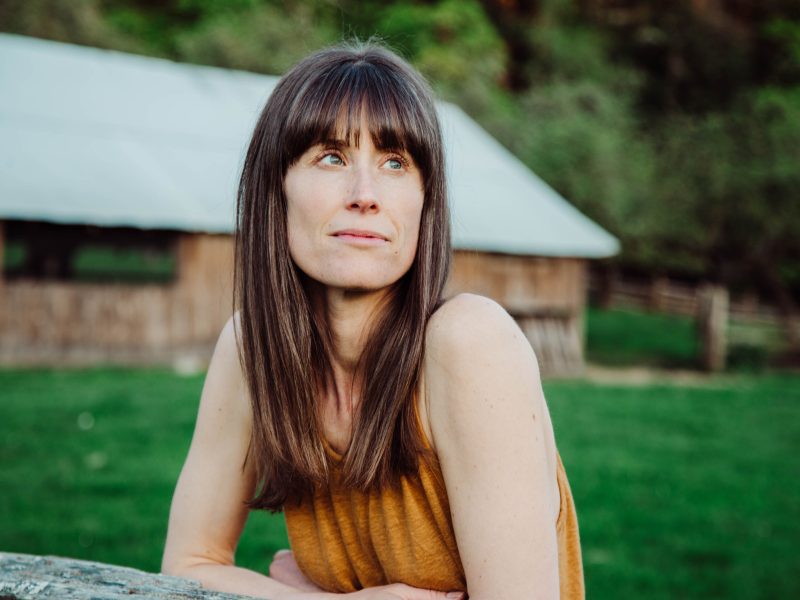
In a rural neighbourhood just outside of Duncan, B.C., on Vancouver Island, a two-year fight between residents and a racetrack has led to a lawsuit, allegations of local government mismanagement and, for some, a belief that local media has been bought out by advertisers.
The Discourse began looking into the Vancouver Island Motorsport Circuit (VIMC) after asking area residents which topics warrant deeper investigation by local media. Though the circuit’s owners say they’re doing nothing wrong, some residents say it’s a noisy nuisance, and wonder how the municipality ever approved its construction.
“I think that most of the Cowichan Valley really does not understand,” says Mariah Wallener, a PhD pharmacologist who lives within a kilometre of the track. “There’s so much more to this than just a loud racetrack.”
Wallener and her neighbours founded the Sahtlam Neighbourhood Association to address issues they were having with the track. They filed Freedom of Information requests for hundreds of records related to the track’s development, and pored through municipal laws and research on acoustics and racetrack developments from around the world.
What they’ve found, she says, reveals significant flaws in local government and local news.
Last year, the neighbourhood association filed a lawsuit against the owners of the track and the Municipality of North Cowichan. According to their statement of claim, filed with the B.C. Supreme Court on June 5, 2017, they allege that the track is a nuisance operating illegally with respect to North Cowichan’s own zoning bylaws. And they want the court to order the owners to stop making so much noise.
Both defendants say the circuit is within permitted uses of the area’s heavy industrial zoning. It’s not a racetrack but a “vehicle training and testing facility,” and it hasn’t caused unreasonable noise that would interfere with residents’ ability to enjoy their properties, the track’s owners add in their statement of defence filed Aug. 14, 2017.
For a detailed timeline of the track, the residents’ pushback, and the local media’s shifting coverage click here.
This is more than just a not-in-my-backyard noise objection, members of the neighbourhood association told The Discourse. It’s about democracy and citizens’ right to be consulted by local government before approving a landscape-altering development — issues that local journalists are supposed to, but failed to, cover in order to hold all parties accountable, they say.
It’s a story unfolding against a backdrop of declining ad revenues and newspaper closures.
“Any time you end up with a racetrack in people’s backyards without consultation, there has got to be a question or two about how that happened,” Cindy Williams, a member of the Sahtlam Neighbourhood Association, wrote in an email to The Discourse. “I’m surprised there has been no coverage of the ins and outs of how the track got approved.”
The Municipality of North Cowichan did not respond to The Discourse’s questions. The VIMC rejects the word “racetrack” and describes its facility as a “motorsports playground where performance driving enthusiasts, friends and businesses come together.” The facility is a 19-hectare resort in a picturesque setting at the foot of Mount Prevost, which defines the Cowichan Valley skyline with its two distinct rocky bluffs.

The circuit does not advertise its membership prices, but an individual membership has been frequently quoted at $48,000 upfront for a 25-year membership, plus $4,800 in annual dues. Members can drive their cars around a 2.3-kilometre circuit designed by world-class racetrack engineers and then relax in a luxury clubhouse. It’s a course “fit to host a Grand Prix,” according to the VIMC website.
Most of the vehicles that use the track are street-legal sports cars, but race cars are also permitted. According to the VIMC website, the maximum number of vehicles on the track at one time is 15, and only on rare occasions are there more than five or six.
Accused of prioritizing advertising over content
When the local municipal government approved the controversial motorsport track, local media was in a period of disruption and flux, with newspapers trading hands and shutting down. The story of Cowichan Valley’s local media is a common one across Canada — hundreds of local newspapers have closed in the past decade.
While much research has documented the impact to democracy of newspaper closures, few stories show how the erosion of local news can coincide with citizens losing confidence in their democratic institutions, like what has occurred in Cowichan Valley.
Residents there allege that advertiser influence is to blame for what they consider the local newspaper’s reluctance to investigate their concerns. The track is owned by a business group, the GAIN Group, that owns more than a dozen car dealerships on the island.
GAIN regularly advertises with Black Press, which owns the area’s one remaining local newspaper, the Cowichan Valley Citizen. (The twice-weekly Citizen became the only newspaper focused on the Duncan area after the 110-year-old Cowichan News Leader Pictorial closed its doors in 2015 and the Duncan Free Press closed its doors in May 2017.)
But Andrew Holota, editorial director of Black Press Media B.C., says the Citizen has published more than a dozen stories on the circuit since its launch, “including several indicating that neighbours had concerns over track noise, as well as an online letter to the editor from one of the key opponents to the noise.”
“GAIN never asked for editorial consideration, much less ever threatened a boycott or implemented any change because of coverage,” he wrote in an email. “That absolutely did not occur.”
Holota added that he has assigned a senior editor to review coverage of the motorsport circuit and ensure that any gaps are addressed. “Black Press is committed to providing fair and balanced coverage of this issue,” he wrote. (The full text of Black Press’s response is available here.)
So why did the GAIN Group suddenly halt advertising in at least three Black Press newspapers for four months in 2017, just as growing tensions between residents and the motorsport track culminated in the lawsuit?
The Discourse conducted a detailed audit of advertising and coverage connected to the GAIN Group and found that the Citizen dutifully covered the council’s actions regarding the circuit up until mid-March 2017, when GAIN’s ads disappeared from the newspaper. After that, not only did the number of articles published about the track seemingly dwindle, but critical coverage nearly evaporated.

Holota was not able to explain the disappearance of ads during that period. In an interview with The Discourse, he advised caution in drawing any inference between the advertising trends in the papers and editorial coverage of the Vancouver Island Motorsport Circuit — and emphasized Black Press’ integrity. The general manager of the Vancouver Island Motorsport Circuit declined to be interviewed for this article, and the GAIN Group did not respond to requests for comment.
Even as residents continue to challenge what they see as the failure of local news coverage and the democratic process, the track has applied for an expansion permit to more than double the total length of its track.
Isabel Rimmer, an emergency room doctor at the Cowichan District Hospital who heads up the non-profit neighbourhood association that’s suing the track, says she and her neighbours are the poster children for what can happen when local newspapers die, advertisers are perceived to have an outsized influence on coverage, and local governments aren’t held accountable.
“The impact of not having [coverage in] the paper that you pick up at the barber shop, at the coffee shop, that you sit down and read after dinner, is really profound,” she said. “How many people have said to me, ‘I haven’t heard anything about the track recently, I haven’t seen anything in the paper.’”

In August 2017, after the Cowichan Valley Citizen ran a story that Rimmer considered particularly biased in the track’s favour, she marched into the paper’s office and asked to speak with the publisher, Warren Goulding.
Rimmer alleges that Goulding told her that the Citizen would not publish an article or letter to the editor covering the Sahtlam Neighbourhood Association’s side of the story. Asked why, he allegedly explained that the circuit’s owners had pulled advertising as a result of critical coverage of the track in the Citizen, and that the orders came from his bosses at Black Press, according to Rimmer.
The Sahtlam Neighbourhood Association published Rimmer’s recollection of the conversation a few days later in a blog post. Goulding emailed Rimmer two days later saying he “was wrong in suggesting we would not publish a letter to the editor from yourself or someone from the SNA,” and committing to “cover this issue in a fair and unbiased manner in the coming weeks.”

Email addresses have been removed from this image.
Reached by phone, Goulding confirmed that the conversation took place but not the substance. “Not something I’m going to talk about,” he told The Discourse. “That was an off-the-record conversation we had that she chose to make — make it public — and that was her decision.” (Rimmer says she never promised Goulding confidentiality.)
Goulding added that Black Press has a right to privacy in its business dealings. “You’re not dealing with a government agency or department here; you’re dealing with a privately owned business,” he says.
The gap in advertising
While Black Press denies that its coverage has been influenced by its advertising relationship with GAIN and the Vancouver Island Motorsport Circuit, an investigation by The Discourse found the drop in GAIN’s car ads occurred right after controversy around the track flared — and coincided with a drop in the paper’s critical coverage of the residents’ concerns.
The Discourse audited two years of the Cowichan Valley Citizen, Saanich News and the Nanaimo News Bulletin — all of which are owned by Black Press — in an effort to determine if there were any gaps in GAIN dealership advertising between May 2016 and May 2018. The result: GAIN advertised regularly in all three newspapers (the Saanich News and the Nanaimo News Bulletin ran up to 40 ads each per month, the Citizen ran up to seven). But from March 21 to July 11, 2017, there were no GAIN ads.

Why did GAIN Group ads disappear for almost four months? Without confirmation from Black Press or GAIN, it’s impossible to say conclusively. But the timing of the missing ads lines up with key events in this story.
In March 2017, the conflict between the Sahtlam Neighbourhood Association and the Vancouver Island Motorsport Circuit was heating up in a public way. The SNA had just confronted the track over its alleged attempt to develop an off-road track on its property without permits in place to do so. The issue was discussed at a public Municipality of North Cowichan council meeting, and reported by the Cowichan Valley Citizen and CTV News.
Holota told The Discourse that there are many possible reasons why GAIN ads in the newspapers might have shifted during this period, and emphasized in an interview with The Discourse that GAIN never threatened to withdraw its ads. “Nor has Black Press refused to report on a story due to concerns surrounding GAIN’s advertising.”
Not the first time
This is not the first time Black Press has been accused of allowing its advertising interests to direct editorial coverage.
In 2007, a reporter resigned and an editor was fired at Victoria News in the wake of a controversy over an article about the potential savings of buying used cars in the United States and importing them to Canada.
In a memo to staff acquired by Public Eye and the Georgia Straight, Black Press COO Rick O’Connor wrote that management had a meeting with reporter Brennan Clarke and editor Keith Norbury to “explain the impact a potential loss of advertising from the automotive sector would have on these newspapers.”
Clarke told the Straight that his resignation was directly related to that meeting. Norbury was fired two days later, and a Black Press executive initially confirmed in an interview with Public Eye that the article about cross-border car shopping and its fallout was part of the reason, though O’Connor later denied it.
O’Connor added in his interview with Public Eye that community newspapers, which rely heavily on advertising revenue, have to be careful. “The financial health, which pays for the salaries of everyone involved in the enterprise, is involved in making sure you have a healthy advertising product. And if you purposely go out and run editorial that could seriously jeopardize that, your business is in jeopardy.”
More than a decade after that controversy, car dealerships remain a significant purchaser of print ads in an era where print ads are becoming harder and harder to sell.
Will track’s proposed expansion get coverage now?
The Vancouver Island Motorsport Circuit is now seeking to expand. Peter Rusland, a former Cowichan Valley journalist who covered Sahtlam Neighbourhood Association’s complaints against the track for the Duncan Free Press before it shut down, believes the track is one of the biggest stories in the Cowichan Valley.
“I wonder, where is the Citizen tonight?” Rusland asked, while at an open house the circuit hosted in April 2018 to tell the community about its plans.
Rusland also used to report for the Cowichan News Leader Pictorial, until Black Press shut it down in 2015, while reporters were on strike. He is critical of his former employer.
“Where are the stories with balanced coverage of the neighbours’ concerns, and the track, and everybody?” he asks.

Richard Hughes, a local media critic who runs the Cowichan Conversations blog, isn’t surprised by what he considers the weak local reporting on the track.
Hughes served as a local representative on the Cowichan Valley Regional District board from 1993 to 2002, and remembers when the local news media landscape was vibrant and competitive. Reporters from two newspapers showed up at meetings and competed for stories. The result was lively, public debate around issues that affect the community.
Now? It’s “pretty pathetic,” he says, “we’ve got the one, sickly paper.”
After the Free Press shut down, the Citizen got worse, he says. It “should be renamed the Advertiser, because there certainly isn’t much in news.”
The municipality now says residents will have a chance to weigh in on the track’s proposed expansion before any new permits are issued.
But those opposed to the expansion aren’t holding out hope that the press will do its part in ensuring local government consults with residents. The Discourse asked Rimmer if she or anyone connected to the Sahtlam Neighbourhood Association has been asked for comment since the Citizen’s publisher promised unbiased coverage in August 2017.
She responded by text message: “No. Nothing. Nada. Zilch.”
Jacqueline Ronson reported for Black Press at the Yukon News in Whitehorse from August, 2013, through June, 2015. She left the company on good terms to move to Vancouver Island.
This piece was edited by Lindsay Sample with copy editing and fact-checking by Jonathan von Ofenheim and Francesca Fionda. Additional support provided by Robin Perelle. The Discourse’s editor-in-chief is Erin Millar.



